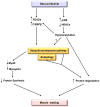Corticosteroids and muscle wasting: role of transcription factors, nuclear cofactors, and hyperacetylation
- PMID: 20473154
- PMCID: PMC2911625
- DOI: 10.1097/MCO.0b013e32833a5107
Corticosteroids and muscle wasting: role of transcription factors, nuclear cofactors, and hyperacetylation
Abstract
Purpose of review: The purpose of this review is to discuss novel insight into mechanisms of glucocorticoid-regulated muscle wasting, in particular the role of transcription factors and nuclear cofactors. In addition, novel strategies that may become useful in the treatment or prevention of glucocorticoid-induced muscle wasting are reviewed.
Recent findings: Studies suggest that glucocorticoid-induced upregulation of the transcription factors Forkhead box O 1 and CCAAT/enhancer-binding protein beta and downregulation of MyoD and myogenin are involved in glucocorticoid-induced muscle wasting. In addition, glucocorticoid-induced hyperacetylation caused by increased expression of the nuclear cofactor p300 and its histone acetyl transferase activity and decreased expression and activity of histone deacetylases plays an important role in glucocorticoid-induced muscle proteolysis and wasting. Other mechanisms may also be involved in glucocorticoid-induced muscle wasting, including insulin resistance and store-operated calcium entry. Novel potential strategies to prevent or treat glucocorticoid-induced muscle wasting include the use of small molecule histone deacetylase activators, dissociated glucocorticoid receptor agonists, and 11beta-hydroxysteroid dehydrogenase type 1 inhibitors.
Summary: An increased understanding of molecular mechanisms regulating glucocorticoid-induced muscle wasting will help develop new strategies to prevent and treat this debilitating condition.
Figures

Similar articles
-
Sepsis and glucocorticoids upregulate p300 and downregulate HDAC6 expression and activity in skeletal muscle.Am J Physiol Regul Integr Comp Physiol. 2010 Aug;299(2):R509-20. doi: 10.1152/ajpregu.00858.2009. Epub 2010 Jun 10. Am J Physiol Regul Integr Comp Physiol. 2010. PMID: 20538901 Free PMC article.
-
Acetylation and deacetylation--novel factors in muscle wasting.Metabolism. 2013 Jan;62(1):1-11. doi: 10.1016/j.metabol.2012.03.019. Epub 2012 May 22. Metabolism. 2013. PMID: 22626763 Free PMC article. Review.
-
Glucocorticoid-induced skeletal muscle atrophy.Int J Biochem Cell Biol. 2013 Oct;45(10):2163-72. doi: 10.1016/j.biocel.2013.05.036. Epub 2013 Jun 24. Int J Biochem Cell Biol. 2013. PMID: 23806868 Review.
-
Sepsis increases the expression and activity of the transcription factor Forkhead Box O 1 (FOXO1) in skeletal muscle by a glucocorticoid-dependent mechanism.Int J Biochem Cell Biol. 2010 May;42(5):701-11. doi: 10.1016/j.biocel.2010.01.006. Epub 2010 Jan 13. Int J Biochem Cell Biol. 2010. PMID: 20079455 Free PMC article.
-
Novel aspects on the regulation of muscle wasting in sepsis.Int J Biochem Cell Biol. 2005 Oct;37(10):2156-68. doi: 10.1016/j.biocel.2005.01.017. Epub 2005 Mar 13. Int J Biochem Cell Biol. 2005. PMID: 16125115 Review.
Cited by
-
Factors Associated with Five-year Deterioration of the Health Assessment Questionnaire-Disability Index in Patients with Rheumatoid Arthritis: A Retrospective Cohort Study.Intern Med. 2023 Jun 15;62(12):1733-1737. doi: 10.2169/internalmedicine.0651-22. Epub 2022 Nov 2. Intern Med. 2023. PMID: 36328576 Free PMC article.
-
Sarcopenia in osteoarthritis and rheumatoid arthritis: The association with self-reported fatigue, physical function and obesity.PLoS One. 2019 Jun 6;14(6):e0217462. doi: 10.1371/journal.pone.0217462. eCollection 2019. PLoS One. 2019. PMID: 31170172 Free PMC article. Clinical Trial.
-
Oligonol, a Low-Molecular Weight Polyphenol Derived from Lychee, Alleviates Muscle Loss in Diabetes by Suppressing Atrogin-1 and MuRF1.Nutrients. 2017 Sep 20;9(9):1040. doi: 10.3390/nu9091040. Nutrients. 2017. PMID: 28930190 Free PMC article.
-
The inflammatory response, a mixed blessing for muscle homeostasis and plasticity.Front Physiol. 2022 Nov 23;13:1032450. doi: 10.3389/fphys.2022.1032450. eCollection 2022. Front Physiol. 2022. PMID: 36505042 Free PMC article. Review.
-
Ishophloroglucin A, Isolated from Ishige okamurae, Alleviates Dexamethasone-Induced Muscle Atrophy through Muscle Protein Metabolism In Vivo.Mar Drugs. 2022 Apr 22;20(5):280. doi: 10.3390/md20050280. Mar Drugs. 2022. PMID: 35621931 Free PMC article.
References
-
- Lecker SH, Goldberg AL, Mitch WE. Protein degradation by the ubiquitin-proteasome pathway in normal and disease states. J Am Soc Nephrol. 2006;17:1807–1819. - PubMed
-
- Tisdale MJ. Mechanisms of cancer cachexia. Physiol Rev. 2009;89:381–410. A comprehensive review of mechanisms involved in muscle wasting in patients with cancer. The role of glucocorticoids is also discussed. - PubMed
-
- Sassoon CSH, Zhu E, Phan HT, et al. Acute effects of high-dose methylprednisolone on diaphragm muscle function. Muscle Nerve. 2008;38:1161–1172. - PubMed
Publication types
MeSH terms
Substances
Grants and funding
LinkOut - more resources
Full Text Sources
Medical
Research Materials
Miscellaneous

